
Regal Cinemas is an American movie theater chain that operates the second-largest theater circuit in the United States, with 6,853 screens in 511 theaters as of December 31, 2021. Founded on August 10, 1989, it is owned by the British company Cineworld and headquartered in Knoxville, Tennessee. The three main theater brands operated by Regal Entertainment Group are Regal Cinemas, Edwards Theatres, and United Artists Theatres.
Cinemark Holdings, Inc. is an American movie theater chain that started operations in 1984 and since then it has operated theaters with hundreds of locations throughout the Americas. It is headquartered in Plano, Texas, in the Dallas–Fort Worth area. Cinemark operates 521 theaters and 5,855 screens in the U.S. and Latin America as of June 30, 2022. It is also the largest movie theater chain in Brazil, with a 30 percent market share.
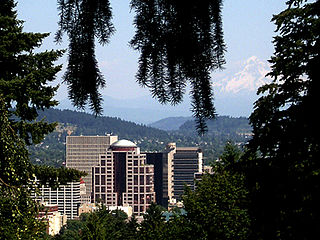
1000 Broadway is a 24-story office building in Portland, Oregon. The distinguishing feature of the building is a series of rings that form a dome over the center portion of its roof. Because of this, the building is nicknamed "The Ban Roll-on Building".

The Pellissier Building and adjoining Wiltern Theatre is a 12-story, 155-foot (47 m) Art Deco landmark at the corner of Wilshire Boulevard and Western Avenue in Los Angeles, California. The entire complex is commonly referred to as the Wiltern Center. Clad in a blue-green glazed architectural terra-cotta tile and situated diagonal to the street corner, the complex is considered one of the finest examples of Art Deco architecture in the United States. The Wiltern building is owned privately, and the Wiltern Theatre is operated by Live Nation's Los Angeles division.
The Blue Mouse Theatre title was used for several historic vaudeville and movie venues opened by John Hamrick in the Pacific Northwest of the United States. The name may have been inspired by a lounge in Paris. Hamrick is said to have used the colored rodential title for his first theatre in each city.
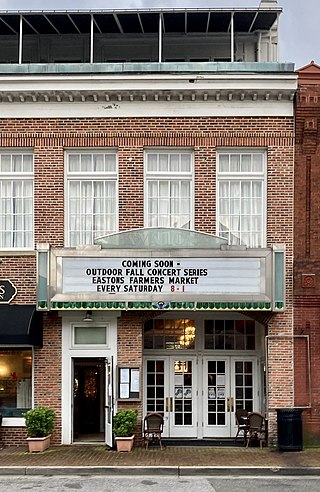
The Avalon Theatre is a historic theater located in downtown Easton, Maryland. Originally built as a cinema in 1921, The Avalon was billed as the "Showplace of the Eastern Shore." Today serves as the prime venue of the Mid-Shore area for performing arts, nationally and locally.

The Hollywood Theatre is a historic movie theater in northeast Portland, Oregon built in 1926. It is a central historical landmark of the Hollywood District, which is named after the theatre itself. The theatre is located at 4122 NE Sandy Blvd, and is operated by a non-profit organization. The Hollywood Theatre was placed on the National Register of Historic Places in 1983 and is considered to be a gem of Northeast Portland's historic culture and tradition. It is the only theater in Oregon showing movies in 70mm film.
Sunnyside is a neighborhood in the south east section of Portland, between SE Stark Street and SE Hawthorne Blvd. and from SE 28th Ave. to SE 49th Ave.. The Sunnyside Neighborhood motto is "Proud Past, Bright Future". Sunnyside has a "strong sense of Portland individuality" with many locally owned coffee shops and businesses. Sunnyside is bordered by Laurelhurst to the north, Richmond to the south, Buckman to the west, and Mount Tabor to the east. Because of its Victorian architecture and bohemian culture, Hawthorne/Belmont is often compared to San Francisco's Haight Ashbury district. Sunnyside has been called Portland's "uncontested champion of eco-consciousness".

The Senator Theatre is a historic Art Deco movie theater on York Road in the Govans section of Baltimore, Maryland. It is the oldest operating movie theater in central Maryland and is listed on the National Register of Historic Places and is a designated Baltimore City Landmark.
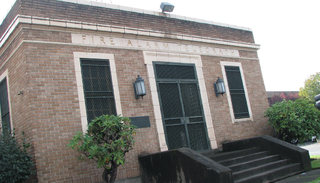
Kerns is a neighborhood in the inner Northeast and Southeast sections of Portland, Oregon. It borders the Lloyd District and Sullivan's Gulch on the north, Laurelhurst on the east, Buckman and Sunnyside on the south, and Old Town Chinatown on the west.
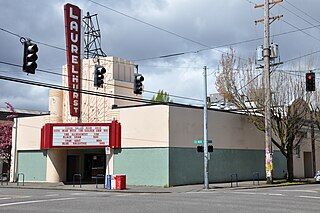
Laurelhurst Theater is a movie theater located in the Kerns neighborhood in northeast Portland, Oregon. Known for showing first and second-run films and for serving food and beer, the theater was constructed in 1923 with an Art Deco design.
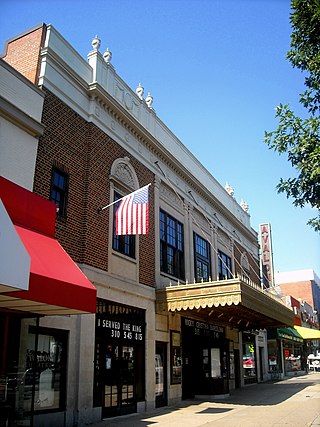
The Avalon Theatre, formerly Chevy Chase Theatre, is an historic structure located in the Chevy Chase neighborhood in the Northwest Quadrant of Washington, D.C. The Classical Revival building was designed by the architectural firm of Upman and Adams and completed in 1922. The Avalon is a rare example of a neighborhood movie house in Washington; it is the oldest in continuous use. It was listed on the National Register of Historic Places in 1996.

The Clinton Street Theater is a theater located in southeast Portland, Oregon, United States. It is believed to be the second oldest operating movie house in the city and one of the oldest continually operating cinemas in the United States. The theater was designed by Charles A. Duke in 1913, built in 1914, and opened as The Clinton in 1915. It became known as the 26th Avenue Theatre in 1945 and the Encore in 1969, before reverting to a resemblance of its original name in 1976. The Clinton often screens exploitation, cult and experimental films, and has become known for hosting regular screenings of The Rocky Horror Picture Show and Repo! The Genetic Opera. The venue also hosts the annual Filmed by Bike festival, the Faux Film Festival and the Portland Queer Documentary Film Festival.

Tomorrow Theater is a movie theater and multimedia space in Portland, Oregon, United States. It is operated by PAM CUT // Center for an Untold Tomorrow, the film and new media center of the Portland Art Museum.

Alhambra Theatre is a theatre building in Portland, Oregon, in the United States. The venue was originally called the Alhambra upon its completion in 1913; subsequent names included Sabala's, the Mt. Tabor Legacy, and Mt. Tabor Theater. Alhambra Theatre was named after a now extinct volcano within Portland's city limits. In April 2016, the venue was permanently closed and subsequently became the QuarterWorld Arcade.

Paris Theatre, formerly Third Avenue Theatre and also known as Paris Theater or Ray's Paris Theatre, is an historic building in Portland, Oregon's Old Town Chinatown neighborhood, in the United States. The theatre was constructed in 1890 and opened as a burlesque house. It was later converted to a cinema, then a club and music venue, before serving as an adult movie theater until 2016. The building was a live venue and nightclub until it closed in October 2019.

At the advent of the 20th century, the city of Portland, Oregon, was among the first on the United States West Coast to embrace the advent of the silent and feature film. The city's first movie palace, the Majestic Theatre, opened in 1911. By 1916, Portland had "the finest array" of movie houses on the West Coast relative to its population, pioneering venues dedicated exclusively to screening films. The popularization of the sound film in the early 1920s resulted in another boom of new cinemas being constructed, including the Laurelhurst, the Hollywood Theatre, and the Bagdad Theatre, the latter of which was financed by Universal Pictures in 1926.

Bombay Cricket Club was an Indian and Middle Eastern restaurant in Portland, Oregon's Buckman neighborhood, in the United States. Karim and Sherri Ahmad owned and operated the business from 1995 to 2016. The popular restaurant screened cricket matches and garnered a positive reception. It was named the city's best Indian restaurant by Portland Monthly in 2004.

Belmont Station is a bar and bottle shop in Portland, Oregon. It operates at the intersection of Stark Street and 45th Avenue, in southeast Portland's Sunnyside neighborhood.

















